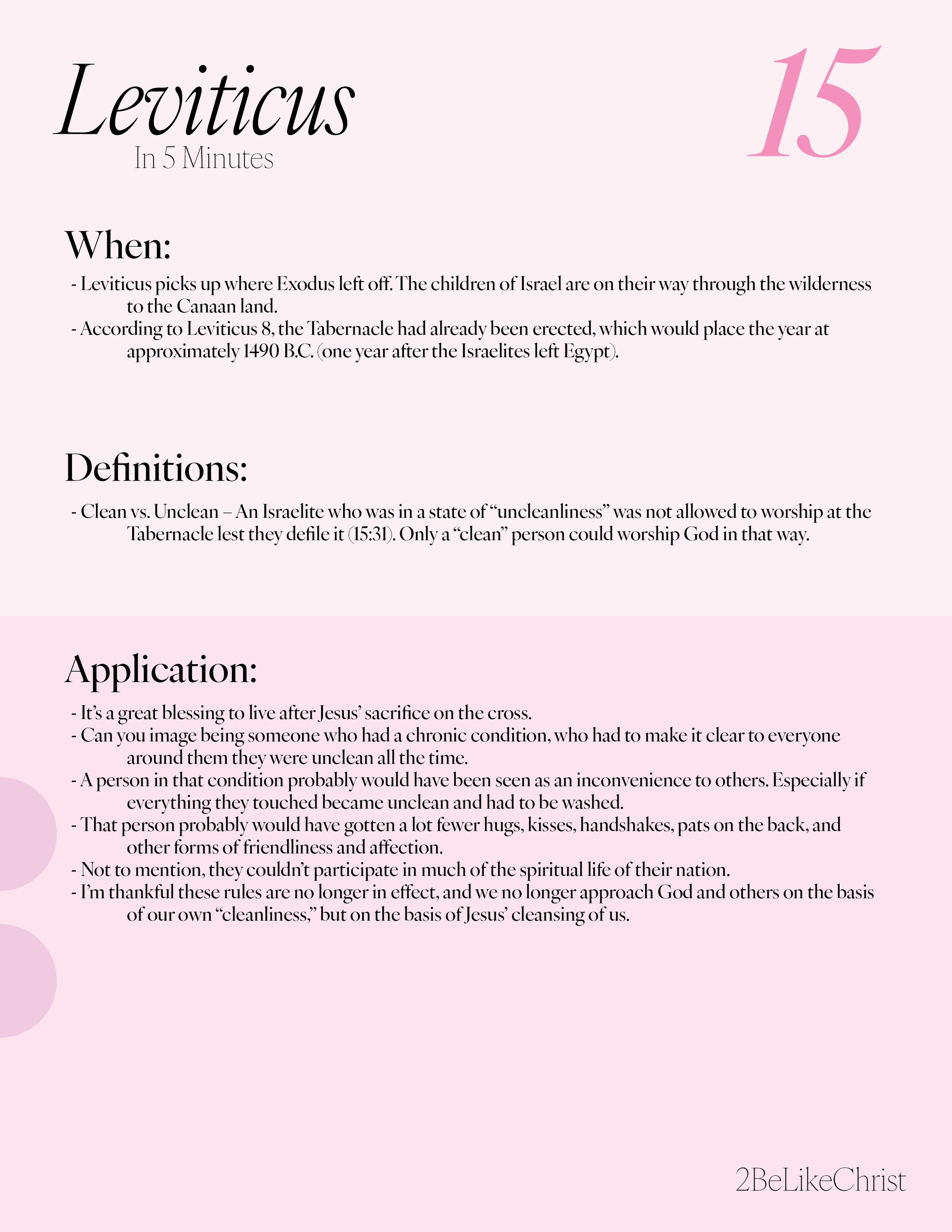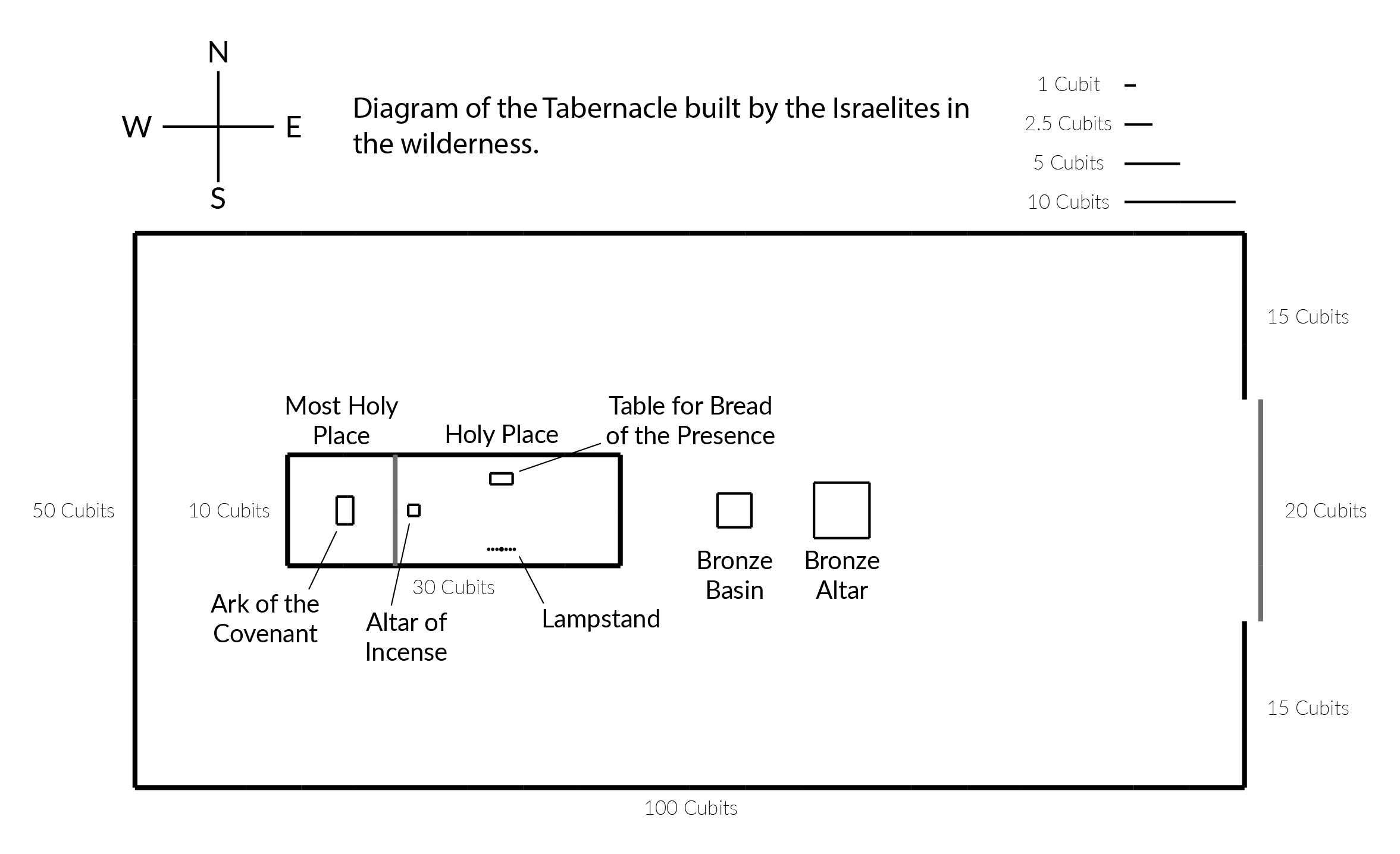Leviticus 15 Summary: A Short Breakdown in 5 Minutes
Leviticus 15 Summary - A Quick Overview
WHEN:
Leviticus picks up where Exodus left off. The children of Israel are on their way through the wilderness to the Canaan land.
According to Leviticus 8, the Tabernacle had already been erected, which would place the year at approximately 1490 B.C. (one year after the Israelites left Egypt).
DEFINITIONS:
Clean vs. Unclean – An Israelite who was in a state of “uncleanliness” was not allowed to worship at the Tabernacle lest they defile it (15:31). Only a “clean” person could worship God in that way.
TABERNACLE DIAGRAM
OUTLINE:
A MAN WITH A DISCHARGE (15:1-15):
God spoke to Moses and Aaron and told them that any man who had a discharge (probably referring to the man’s genital organ) was to be considered unclean.
While he had the discharge, his bed and everything he sat on was to be considered unclean.
Anyone who touched his bed or sat where he sat was unclean and had to wash their clothes and bathe.
Anyone who touched the man was unclean until evening.
If he spat on someone, that person became unclean.
If he rode in a saddle, that saddle became unclean.
A man with a discharge could only touch another person if he washed his hands first.
If he touched an earthenware vessel, the vessel was to be broken.
If he touched a wood vessel, it was to be rinsed in water.
When the man’s discharge went away, he was to wait 7 days and then wash his clothes and bathe himself.
On the 8th day, he was to take 2 turtledoves or 2 pigeons and have the priests sacrifice them for a sin offering and a burnt offering.
LAWS REGARDING AN EMISSION OF SEMEN (15:16-18):
If a man had an emission of semen, he was to bathe in water and be unclean until the evening.
Any garment that the semen touched was to be washed.
If a man and woman had sex and the man ejaculated, both the man and the woman were to wash and be unclean until the evening.
LAWS REGARDING MENSTRATION AND UNCLEANLINESS (15:19-24):
When a woman experienced menstrual bleeding, she was unclean for 7 days.
Anyone who touched her was unclean until the evening.
Anything the woman touched or sat on was considered unclean.
Anyone who touched her bed or anything on which she sat was unclean.
If a man had sexual relations with a woman her and her blood accidently got on him, he was unclean for 7 days.
LAWS REGARDING NON-MENSTRUAL BLEEDING (15:25-33):
If a woman had a discharge of blood that was not part of her usual menstrual cycle, she was unclean as long as the blood persisted.
Her bed and anything she sat on was unclean.
Anyone who touched a place she sat or touched her bed was unclean until evening.
If the discharge of blood stopped, she was considered clean after 7 days.
On the 8th day, she was to take 2 turtledoves and 2 pigeons to the priest so he could offer a sin offering and burnt offering for her.
APPLICATION:
It’s a great blessing to live after Jesus’ sacrifice on the cross.
Can you image being someone who had a chronic condition, who had to make it clear to everyone around them they were unclean all the time.
A person in that condition probably would have been seen as an inconvenience to others. Especially if everything they touched became unclean and had to be washed.
That person probably would have gotten a lot fewer hugs, kisses, handshakes, pats on the back, and other forms of friendliness and affection.
Not to mention, they couldn’t participate in much of the spiritual life of their nation.
I’m thankful these rules are no longer in effect, and we no longer approach God and others on the basis of our own “cleanliness,” but on the basis of Jesus’ cleansing of us.


